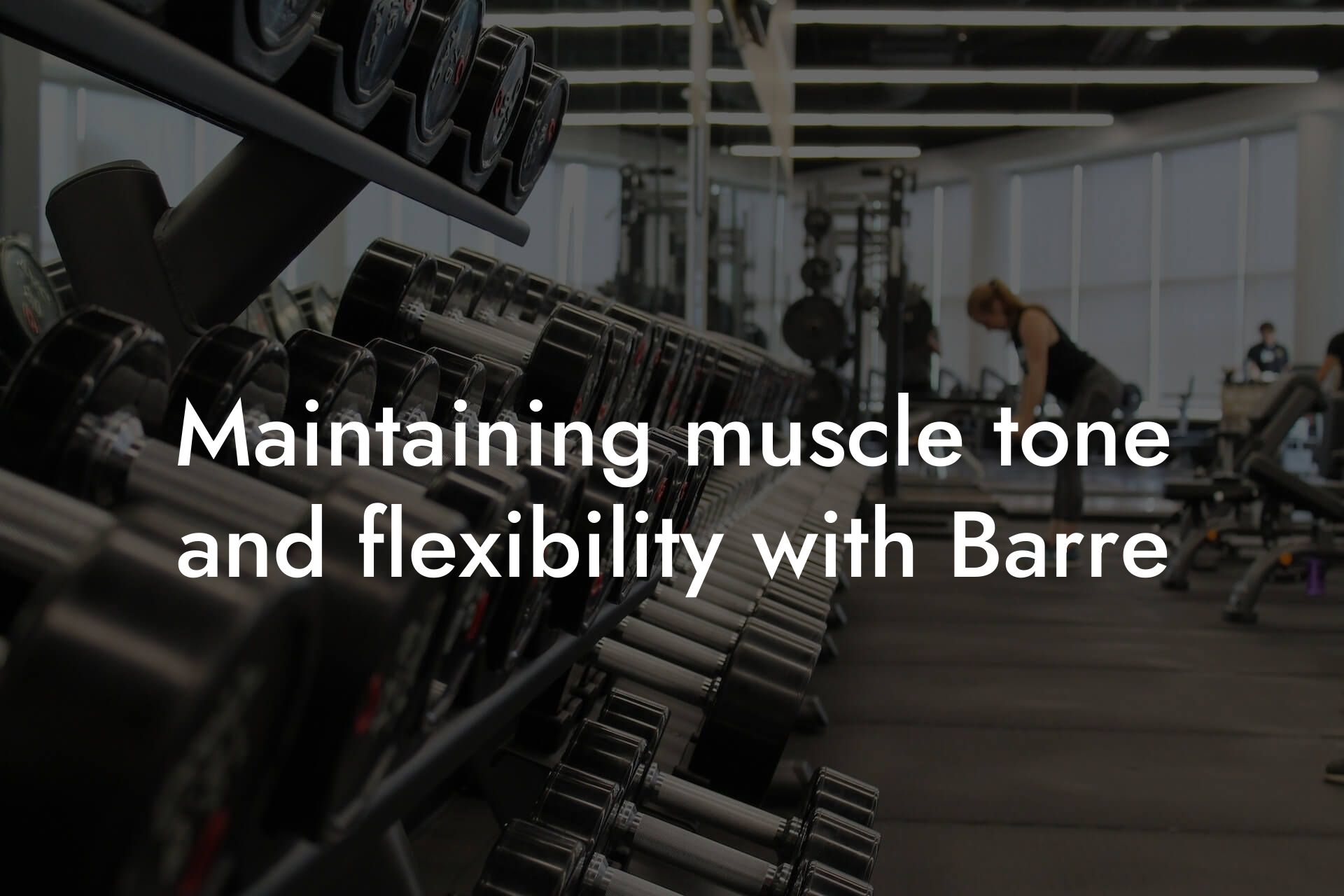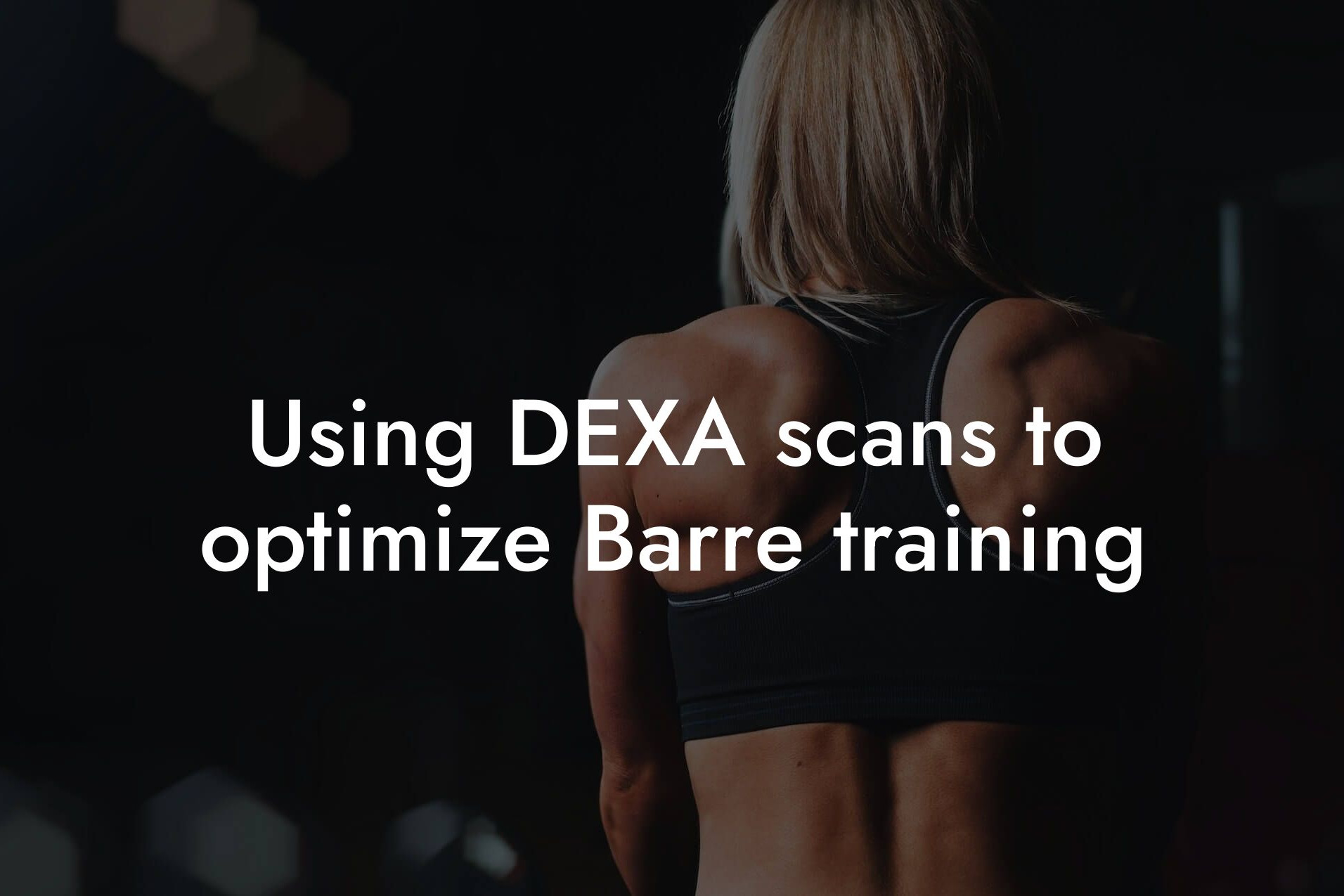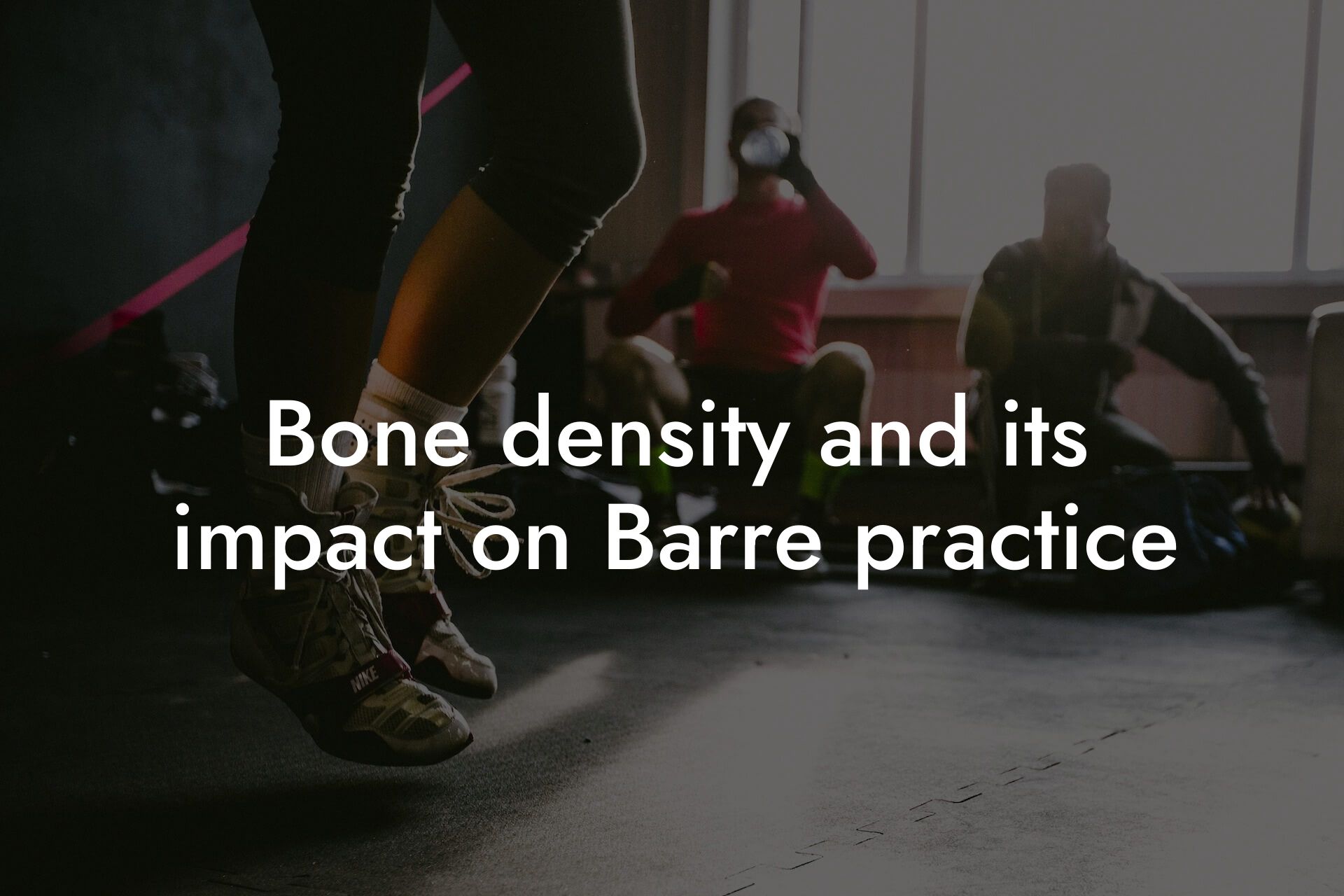As a high-earning professional, you understand the importance of maintaining a healthy and fit physique. Engaging in regular exercise, such as Barre classes, is an excellent way to achieve your fitness goals. However, to get the most out of your workout, it's essential to fuel your body with the right nutrients. In this article, we'll provide you with expert nutrition tips to help you maintain sustained energy throughout your Barre classes and beyond.
Table of Contents
Understanding Barre Classes and Energy Demands
Barre classes are a form of exercise that combines elements of ballet, Pilates, and yoga to provide a full-body workout. These classes typically involve a combination of strength training, cardio, and flexibility exercises, which can be physically demanding. To perform at your best, you need to ensure that your body has the necessary energy stores to meet the demands of the class.
Macronutrients for Energy Production
There are three primary macronutrients that provide energy for your body: carbohydrates, protein, and fat. Understanding how each of these macronutrients contributes to energy production is crucial for optimal performance in Barre classes.
Carbohydrates are the body's primary source of energy, and they come in two forms: simple and complex. Simple carbohydrates, such as sugars, are quickly digested and provide a rapid energy boost. Complex carbohydrates, such as whole grains and fiber, take longer to digest and provide sustained energy.
Protein is essential for building and repairing muscle tissue, which is critical for Barre classes. While protein doesn't provide energy directly, it helps to support the body's energy production processes.
Fat is an essential source of energy for low-intensity exercise, such as yoga or stretching. However, during high-intensity exercise like Barre classes, the body relies more heavily on carbohydrates for energy.
Pre-Workout Nutrition
What you eat before a Barre class can significantly impact your energy levels and performance. Aim to eat a balanced meal or snack that includes a mix of complex carbohydrates, protein, and healthy fats 1-2 hours before your class.
Some examples of pre-workout snacks include:
- Whole grain toast with avocado and eggs
- Oatmeal with banana and almond butter
- Greek yogurt with berries and honey
Intra-Workout Nutrition
During a Barre class, it's essential to stay hydrated by drinking plenty of water. Aim to drink at least 8-10 glasses of water throughout the day, and bring a water bottle with you to class.
If you're taking a longer or more intense class, you may want to consider consuming a small amount of carbohydrates during the class to maintain energy levels. Some examples of intra-workout snacks include:
- Dried fruit, such as dates or apricots
- Energy chews or gummies
- Coconut water or sports drinks
Post-Workout Nutrition
After a Barre class, it's essential to refuel your body with a balanced meal or snack that includes carbohydrates and protein. This helps to replenish energy stores, repair muscle tissue, and support muscle growth.
Aim to eat a post-workout meal or snack within 30-60 minutes after your class, and include a mix of carbohydrates and protein. Some examples of post-workout snacks include:
- Smoothie with banana, protein powder, and almond milk
- Whole grain crackers with peanut butter and banana slices
- Grilled chicken breast with quinoa and steamed vegetables
Hydration and Electrolytes
Proper hydration is essential for optimal performance in Barre classes. Aim to drink at least 8-10 glasses of water throughout the day, and bring a water bottle with you to class.
In addition to hydration, it's also important to replenish electrolytes, such as sodium, potassium, and magnesium, which are lost through sweat. You can replenish electrolytes through sports drinks, coconut water, or electrolyte tablets.
Meal Frequency and Timing
To maintain sustained energy throughout the day, it's essential to eat regular meals and snacks. Aim to eat 3-5 main meals and 2-3 snacks in between, spaced evenly throughout the day.
Additionally, consider your meal timing in relation to your Barre class. Eating a meal or snack too close to your class can cause digestive discomfort, so aim to eat at least 1-2 hours before your class.
Individualized Nutrition Needs
Everyone's nutrition needs are different, and it's essential to consider your individual needs when it comes to fueling your body for Barre classes. Factors such as age, weight, height, and fitness level can all impact your energy demands and nutrition requirements.
At Tano Performance Group, we offer comprehensive body assessments using a DEXA machine, which can help you understand your individual nutrition needs and optimize your diet for peak performance. Contact us today to learn more about our services and how we can help you achieve your fitness goals.
By following these expert nutrition tips, you can maintain sustained energy throughout your Barre classes and achieve your fitness goals. Remember to focus on a balanced diet that includes complex carbohydrates, protein, and healthy fats, and stay hydrated by drinking plenty of water. With the right nutrition and training, you can take your physique to the next level and achieve optimal performance in Barre classes and beyond.
Frequently Asked Questions
What is the importance of nutrition in Barre classes?
Nutrition plays a crucial role in Barre classes as it provides the necessary energy and fuel for your body to perform optimally. A well-balanced diet can help improve your endurance, flexibility, and overall performance, allowing you to get the most out of your Barre workout.
What are the benefits of sustained energy in Barre classes?
Sustained energy in Barre classes can help you power through challenging movements, maintain proper form, and reduce fatigue. This can lead to improved overall performance, increased calorie burn, and enhanced muscle tone.
What are the common energy-boosting foods for Barre classes?
Some common energy-boosting foods for Barre classes include complex carbohydrates such as whole grains, fruits, and vegetables, as well as lean protein sources like nuts, seeds, and lean meats. Healthy fats like avocado and olive oil can also provide sustained energy.
How can I avoid energy crashes during Barre classes?
To avoid energy crashes during Barre classes, it's essential to maintain stable blood sugar levels by eating balanced meals and snacks, staying hydrated, and avoiding sugary and processed foods that can cause energy spikes and crashes.
What is the ideal pre-Barre class meal?
The ideal pre-Barre class meal should include a balance of complex carbohydrates, lean protein, and healthy fats. Examples include oatmeal with banana and almond butter, whole-grain toast with avocado and eggs, or a smoothie bowl with Greek yogurt, berries, and chia seeds.
How long before a Barre class should I eat?
It's recommended to eat a meal or snack 1-2 hours before a Barre class to allow for proper digestion and to prevent discomfort during the workout. However, everyone's digestive system is different, so experiment to find what works best for you.
What are some healthy snack options for Barre classes?
Healthy snack options for Barre classes include fruits, nuts, energy bars, trail mix, and energy chews. Look for snacks that are high in complex carbohydrates and protein to provide sustained energy.
Can I eat during a Barre class?
It's generally not recommended to eat during a Barre class as it can cause discomfort and distraction. Instead, focus on staying hydrated by drinking water throughout the class.
How much water should I drink during a Barre class?
Aim to drink at least 8-10 ounces of water during a Barre class to stay hydrated and prevent dehydration. You can also drink water before and after the class to help with recovery.
What are some post-Barre class nutrition tips?
After a Barre class, focus on replenishing your energy stores with a balanced meal or snack that includes complex carbohydrates and lean protein. Aim to eat within 30-60 minutes after the class to aid in recovery.
How can I reduce muscle soreness after a Barre class?
To reduce muscle soreness after a Barre class, focus on stretching and foam rolling, and consider taking a warm bath or using a topical cream to reduce inflammation. Adequate nutrition, including protein and omega-3 fatty acids, can also help with recovery.
What are some common nutrition mistakes to avoid in Barre classes?
Common nutrition mistakes to avoid in Barre classes include not eating enough, eating too much sugar, and not staying hydrated. Avoiding these mistakes can help you perform better and reduce the risk of injury.
How can I customize my nutrition plan for Barre classes?
To customize your nutrition plan for Barre classes, consider your individual needs, fitness goals, and dietary restrictions. Experiment with different foods and portion sizes to find what works best for you, and consult with a registered dietitian or nutritionist if needed.
What is the role of electrolytes in Barre classes?
Electrolytes, such as sodium, potassium, and magnesium, play a crucial role in Barre classes by helping to regulate fluid balance and nerve function. Include electrolyte-rich foods like bananas, dates, and coconut water in your nutrition plan to stay hydrated and perform optimally.
How can I stay energized during a long Barre class?
To stay energized during a long Barre class, focus on maintaining stable blood sugar levels by eating balanced meals and snacks, staying hydrated, and avoiding sugary and processed foods. Consider bringing a healthy snack to class if needed.
What are some nutrition tips for Barre classes during menstruation?
During menstruation, focus on increasing your iron intake to combat fatigue and weakness. Include iron-rich foods like lean meats, spinach, and beans in your nutrition plan, and consider taking an iron supplement if needed.
How can I use nutrition to improve my overall Barre performance?
To improve your overall Barre performance, focus on fueling your body with a balanced diet that includes complex carbohydrates, lean protein, and healthy fats. Stay hydrated, and experiment with different foods and portion sizes to find what works best for you.
What are some common Barre class nutrition myths?
Common Barre class nutrition myths include the idea that you need to eat a lot of protein to build muscle, or that you should avoid carbohydrates altogether. Debunk these myths by focusing on a balanced diet that includes a variety of nutrient-dense foods.
How can I track my nutrition progress for Barre classes?
To track your nutrition progress for Barre classes, consider keeping a food diary or using a nutrition tracking app. Monitor your energy levels, performance, and overall health to make adjustments to your nutrition plan as needed.
What are some nutrition tips for Barre classes during pregnancy?
During pregnancy, focus on fueling your body with a balanced diet that includes complex carbohydrates, lean protein, and healthy fats. Stay hydrated, and avoid sugary and processed foods that can cause energy crashes and discomfort.
How can I use nutrition to aid in recovery after a Barre class?
To aid in recovery after a Barre class, focus on replenishing your energy stores with a balanced meal or snack that includes complex carbohydrates and lean protein. Stay hydrated, and consider incorporating anti-inflammatory foods like turmeric and ginger into your nutrition plan.
What are some nutrition tips for Barre classes during menopause?
During menopause, focus on fueling your body with a balanced diet that includes complex carbohydrates, lean protein, and healthy fats. Stay hydrated, and consider incorporating foods that help with hormone regulation, such as omega-3 fatty acids and vitamin D.
How can I make nutrition a priority for Barre classes?
To make nutrition a priority for Barre classes, focus on planning your meals and snacks in advance, and make healthy choices a habit. Consider working with a registered dietitian or nutritionist to develop a personalized nutrition plan that meets your needs and goals.
Here are some related articles you might love...
- Maintaining muscle tone and flexibility with Barre
- Using DEXA scans to optimize Barre training
- Bone density and its impact on Barre practice
- How to integrate Barre into a balanced fitness routine
- Recovery strategies for Barre practitioners
- Reducing body fat for improved Barre results
- Barre for injury prevention and rehabilitation
- The importance of core strength in Barre fitness
- How body composition impacts Barre performance
Zak Faulkner
Zak Faulkner is a leading authority in the realm of physical health and body composition analysis, with over 15 years of experience helping professionals optimise their fitness and well-being. As one the experts behind Tano Performance Group, Zak has dedicated his career to providing in-depth, science-backed insights that empower clients to elevate their physical performance and overall health.
With extensive knowledge of DEXA technology, Zak specializes in delivering comprehensive body assessments that offer precise data on body fat, muscle mass, bone density, and overall physique. His expertise enables individuals to make informed decisions and achieve their fitness goals with accuracy and confidence. Zak’s approach is rooted in a deep understanding of human physiology, combined with a passion for helping clients unlock their full potential through personalised strategies.
Over the years, Zak has earned a reputation for his commitment to excellence, precision, and client-focused service. His guidance is trusted by top professionals who demand the best when it comes to their health. Whether advising on fitness programs, nutritional strategies, or long-term wellness plans, Zak Faulkner’s insights are a valuable resource for anyone serious about taking their health and fitness to the next level.
At Tano Performance Group, Zak continues to lead our Content Team revolutionising how professionals approach their physical health, offering unparalleled expertise that drives real results.




